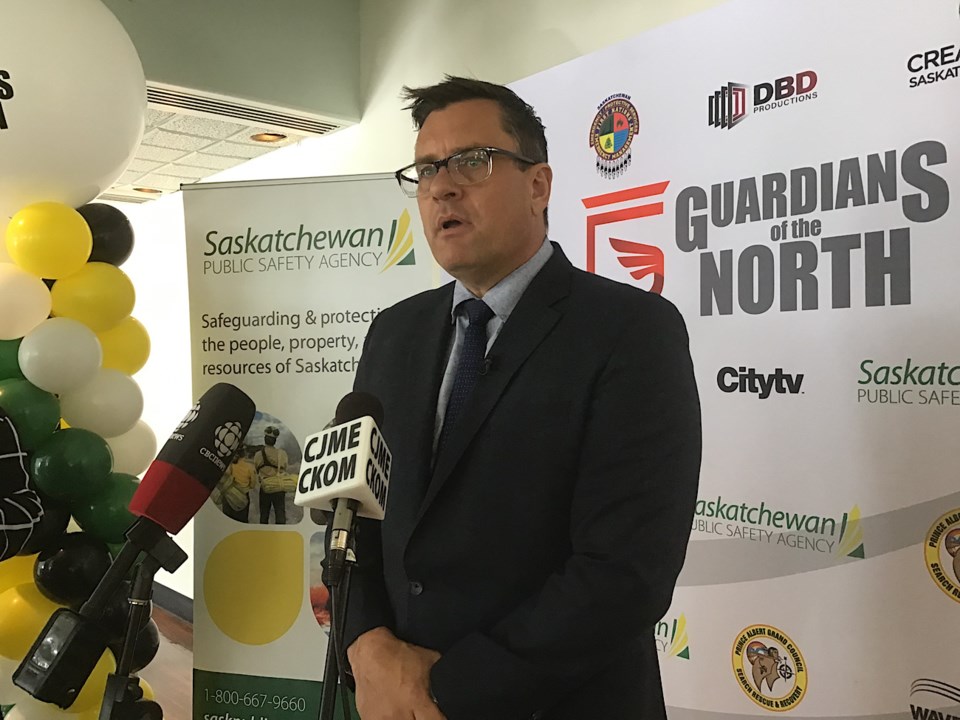REGINA - With a relatively dry winter season and the impacts of El Niño weather patterns being felt, mounting concerns have been expressed that wildfire season in Saskatchewan could happen earlier and be more severe than last year.
Earlier this week, NDP critics MLAs Nicole Sarauer, Jared Clarke, and Aleana Young made public a letter sent to Minister of Corrections, Policing and Public Safety Paul Merriman expressing concerns about drought conditions in the North and the potential for the second year of the El Niño cycle to be hotter and drier. Theyasked what the government is doing to prepare for fire season, and whether the government plans to announce the wildfire season earlier than in 2023, among other questions.
In speaking to reporters Thursday in Regina, Merriman confirmed he had seen the letter from the three MLAs. He expressed confidence in the work of the Saskatchewan Public Safety Agency to be ready for wildfire season.
“Obviously, we have been doing our preparation work. We have been doing maintenance since the end of last season, we started our hires in January, training is commencing in March. We are ready for anything that the fire season or anything else throws at us for this upcoming year. Obviously I can’t preempt what budgetary decisions are coming out, that’ll come out in the budget. But we understand the importance and I think SPSA has demonstrated what they’ve been able to do in the last two or three fire seasons that have been unprecedented, and what they’ll do if there are some challenges in the future. So I’m very very supportive and I think the people of Saskatchewan are supportive of what the SPSA can do and will do for us.”
As for concerns that fire seasons could start earlier in the future, Merriman said a “a lot of it is out of our control. The stats that I’ve been told are half the fires are from lightning and the other half are human caused, so the ones that are human caused we do have control over those.”
Merriman reiterated the message to make sure people are putting out their campfires, and make sure they are not throwing cigarettes out in the ditch that could cause a fire, as one small spark could lead to something threatening a community.
“We have to avoid that, so people have to be very careful about what they are doing to be able to protect our communities in the North.”
He also said “two of 3 inches of rain in the north in March would probably help out a lot,” but reiterated “we’re ready to deal with whatever is thrown at us.”
Bryan Chartrand, Executive Director of Land Operations for Saskatchewan Public Aafety Agency, explained how SPSA was getting ready for fire season.
“We’re constantly monitoring the forecast and the models and what the possibilities could bring. It’s a little early and challenging for us to predict what it’s going to be so as time goes by, we’re going to gradually get a better understanding on what that is.”
Chartrand said they’ve already advertised for positions for new staff and have been bringing staff back early in preparation of aircraft in preparation for an earlier season. “With this time of year we could get more snow, we could get more rain. It’s very difficult to say right now, but regardless, we are ready for whatever brings comes early.”
Last year’s fire season across Canada was considered one of the worst in history. In Saskatchewan wildfire season began unusually early in May, leading to evacuations from northern communities impacted.
As for lessons learned from last year, Chartrand said the main one was “Mother Nature is relentless, and we’ve got to be prepared all the time. We need to be quick, we need to be professional, have our gear and equipment ready, people trained, and engage these fires as quickly as possible so that nobody lose any values or any lives are threatened.”





